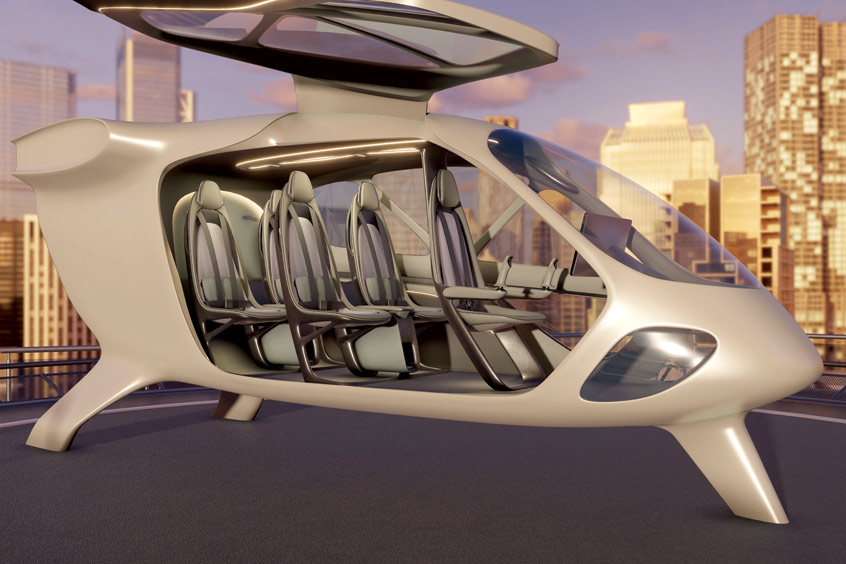ACE 2026 - The home of global charter.
• Farnborough International Airshow 2026
• Supernal, LLC
Aircraft
BAN's World Gazetteer
• U.K. The bimonthly news publication for aviation professionals.
The bimonthly news publication for aviation professionals.

Supernal, the urban air mobility division of Hyundai Motor Group, revealed its initial eVTOL vehicle cabin concept at Farnborough International Airshow, providing the first look at how Hyundai Motor Group is integrating automotive capabilities to develop the advanced air mobility (AAM) market.
Supernal partnered with the Group's design studios to create the cabin concept as it works to certify its eVTOL vehicle for commercial use in the US, starting in 2028, and in the EU and UK shortly after. Beyond the vehicle, Supernal is collaborating with external partners and the Group's more than 50 affiliates, spanning automobiles, automotive parts, construction, robotics and autonomous driving, to responsibly co-create the expansive AAM value chain.
"In order for advanced mobility to become a wide-spread mode of transportation, every detail from the passenger experience to regulations and infrastructure needs to be addressed from the start and work in lockstep with one another," says Hyundai Motor Group president and Supernal CEO Jaiwon Shin. "Leveraging Hyundai Motor Group's mobility capabilities, Supernal is investing time and resources upfront to ensure the industry can scale to the masses in the coming decades and reach its exciting potential."
Supernal's five seat cabin concept provides clues to how the company is harnessing automotive design processes and materials, while meeting commercial aviation's highest safety standards to optimise the AAM passenger experience and price point. The design embodies biomimicry philosophy, a butterfly in this case, and the company's pillars of safety, human-centred design and environmental responsibility.
"Supernal is partnering with Hyundai Motor Group's top automotive designers to develop our eVTOL vehicle for manufacturability and wide-spread public acceptance," Shin adds. "We are taking the time to create a safe, light-weight commercial eVTOL that provides our future passengers with the security and comfort they find in their own cars."
The team of engineers and designers utilised the automotive industry's reductive design approach to create the light-weight interior cabin, which is made of forged carbon fibre. Ergonomically contoured seats offer a cocoon-like environment for passengers. Deployable seat consoles mimic automobile centre consoles and provide a charging station and stowage compartment for personal items. Grab handles built into the cabin doors and seatbacks assist with ingress and egress. A combination of lighting, including overhead lights inspired by automobile sunroofs, adjusts with the various stages of flight to emulate a 'light therapy' effect. The cabin layout draws on automotive space innovation with a minimised bulkhead, which allows for generous headroom and package functionalities.
With sustainability as a priority, the cabin concept incorporates materials such as advanced recyclable carbon fibre reinforced thermoplastic, durable plant-based leather, recycled plastic fabric and responsibly sourced woods. The seat frame also utilises excess raw material from the airframe manufacturing process.
"The Supernal eVTOL vehicle draws on the competence of the Hyundai Motor Group and the skillset of experienced automotive designers, which allowed us to develop a new air mobility concept that is not only safe and rational but also highly emotional," says Hyundai chief creative officer Luc Donckerwolke.
The Group is leveraging its expansive mobility and mobility-enabling capabilities to develop a family of electric air vehicles, as well as the surrounding value chain.
Complementing US-based Supernal's battery-powered eVTOL vehicle designed for intra-city passenger journeys starting in 2028, the Group's Korea-based division focused on regional air mobility is developing a hydrogen-powered mid-sized vehicle for regional city-to-city cargo and passenger journeys, planed for launch in the 2030s.
Supernal and the division are partnering with the Group's manufacturing innovation teams across the globe to create a robust high rate, high quality AAM manufacturing process that will produce electric air vehicles at scale, and at an increasingly affordable price point, over the coming decades.
"Hyundai Motor Group is working to leverage synergies between automotive's high-rate manufacturing capabilities and aerospace's high certification standards to build the foundation for everyday use of passenger and cargo air vehicles," adds Shin.